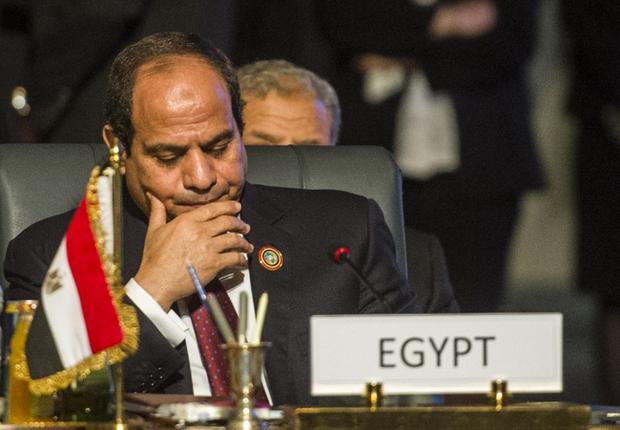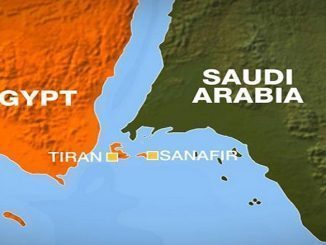
Al-Sisi’s latest trip to Africa in the light of the twenty-seventh ordinary session of the African summit in Kigali, the capital of Rwanda seems cold, fragile and reflects al-Sisi’s weak diplomacy toward his country’s lebensraum.
Al-Sisi met many African leaders to negotiate and tackle issues of mutual interests between the African countries. But the issues tackled by Egypt lacked strategy and reflected al-Sisi’s short sighted vision to the Egyptian African relations despite his country’s fears of a water crisis as well as the national security threats on its borders with Sudan.
Al- Sisi’s meetings with the African leaders:
Al- Sisi meetings with the leaders of the African countries during his participation in the summit came as follows:
Rwanda
Al-Sisi’s meeting with the president of Rwanda Paul Kagame at his resident in Kigali was normal and neutral as it didn’t exceed the diplomatic compliments as Rwanda is the host country of the summit.
Al-Sisi expressed his appreciation for Rwanda’s reception to the Egyptian delegation although al-Sisi and his delegation were received by a low diplomatic representative that caused an Egyptian dissent among the media. The Egyptian delegation was received by Rwanda ambassador to Egypt Saleh Habimana and some diplomatic officials.
Egypt’s visit to Rwanda is very important as it is one of the Nile basin countries that needs a great effort from the Egyptian government to maintain its national security. However, the meeting was very weak compared with the latest visit of Benjamin Netanyahu, the Israeli Prime Minister’s, to Rwanda.
In Netanyahu’s visit, both sides signed a number of bilateral agreements in the areas of a joint declaration of intent on innovation, visa exemption for holders of diplomatic passports, a joint declaration in the field of agriculture, water, transportation, exchanging students and encouraging tourism between both countries.
Sudan
Al-Sisi’s meeting with Sudan’s president Omar al-Bashir was of a great importance in the light of the rising tension between both countries on the disputed border of Halai’b and Shalateen and the water crisis file that escalated after the establishment of the Renaissance Dam.
Accordingly, Egypt should have taken the opportunity to enhance its relation with its neighbor country especially that the situation in al-Khartoum and Juba is fragile. In al-Khartoum, the disputes in Darfur region has been renewed lately and in southern Sudan, the disputes are also renewed between the president of South Sudan Salva Kiir and his vice president Riek Machar.
Moreover, the Israeli penetration of South Sudan is obvious which makes it crucial for the Egyptian government to work on improving its relations with Sudan. Egypt should also work on reevaluating the internal situation on its neighboring country because Egypt’s southern borders are in direct confrontation with Sudan’s unstable conditions.
Somalia
In the same context, al-Sisi’s meeting with the Somalian President Hassan Sheikh Mahmoud is important especially with the news circulating by the Israeli media that the Somalian President has visited Tel Aviv this month. Somalia’s importance to Egypt’s national security as it is an essential exit to the Red Sea due to its close position to bab al-Mandab strait where Israel seeks to have a foot.
In addition, enhancing the Egyptian Somalian relations is crucial due to Somalia’s close ties with Ethiopia. However, al-Sisi’s meeting with the Somalian President didn’t meet the expectations as Egypt only focused on diplomatic messages and general speeches. Egypt expressed its support to the stability and the unity of Somalia as well as its support to “Somalia’s Vision 2016”. Egypt also renewed its support to the development of Somalia and the building of Somalian Cadres in various fields.
On the other side, Turkey -Egypt’s adversary- is preparing to establish a military base in Somalia and it will also train nearly 10,500 Somalian soldiers during the coming period.
Congo, Togo, and Ghana
Enhancing close ties with all African countries is important to Egypt but there should be a list of priorities on Egypt’s agenda. In this context, meeting the leaders of those countries is less important and influential on the Egypt’s depth. There are countries that are more important than Congo, such as Ethiopia, regarding the effect of linking the Nile River with the Congo river. Also, enhancing the relations with South Africa is much more important than Togo as South Africa is one of the biggest economic powers in Africa.
Moreover, the extremist position of Congo, Togo, and Ghana in western Africa put them in a non-influential position to Egypt’s national security.
African countries al-Sisi didn’t meet
There are a number of influential African countries that al-Sisi didn’t meet despite their great importance to Egypt’s national security due to their close position to Egypt’s maritime gate as Djibouti or for its importance to Egypt’s water security as Ethiopia. In addition, Eritrea, Uganda, as well as Ethiopia, are among the African countries where the Zionist entity is penetrating but al-Sisi didn’t meet their leaders although the African summit was a good opportunity for Egypt to hold several meetings with them.
Ethiopia
Ethiopia is one of the most strategic countries to Egypt that has dropped from Egypt’s diplomatic agenda. By establishing the Renaissance Dam, Ethiopia will succeed in controlling the Nile water coming to Egypt especially with Ethiopia’s explicit intentions on building three other dams. In addition, there is a bilateral coordination between Ethiopia and Israel, especially with the ceremonial visit to Israeli Prime Minister Benjamin Netanyahu in the Ethiopia’s parliament weeks ago that came parallel with the opening of the first phase of the Renaissance Dam.
Moreover, Israel ‘s presence has become natural in the construction of the Renaissance Dam, as Ethiopia handled an Israeli power company to carry out the electricity in the country. Also, there are several security companies in Ethiopia to secure the Renaissance Dam. There are also bilateral security cooperation agreements and protocols between Ethiopia and Israel in the security fields.
Uganda
Uganda is one of the Nile basin countries which is important for Egypt to enhance its close ties with, but it seems that it wasn’t on Egypt’s top agenda as it was for Israel. In Uganda, Netanyahu said, “Africa returned to Israel” and it seems that Uganda is of a strategic importance to Israel as around 50 companies and 80 businessmen have accompanied Netanyahu in his latest African tour. In contrast, the Egyptian role in Uganda is very weak and the number of the Egyptian businessmen operating in African countries is limited compared to Israel. Egypt’s role in Africa is limited to some construction issues as the Arab Contractors Company, the Citadel Company, and al-Sewedy Company.
Djibouti
Djibouti is one of the main pillars of Egypt’s national security for its location at Bab al-Mandab strait, on the Red Sea. In addition, Djibouti’s importance increased with the withdrawal of Egypt’s influence in the Red Sea after giving away Tiran and Sanafir islands to Saudi Arabia. The absence of Egypt’s role in Djibouti gave the chance for other countries to penetrate the country as Djibouti turned to one of the major countries to hold military bases for various countries except for Egypt. The countries which have military bases in Djibouti are U.S.A, France, Japan, China, and Saudi Arabia.
Eritrea
Eritrea is an observer in the Nile basin countries and its importance resides for its location on the Mediterranean sea. However, Israel holds a military base in Eritrea and supports it with weapons. On the other hand, Egypt’s role in Eritrea has been weakened recently compared to other Arab countries such as U.A.E which has a naval base there.
Algeria
Egypt’s coordination with Algeria is very crucial at this moment as Algeria is leading a diplomacy campaign to convince African countries for not approving the presence of Israel as an observer in the African Union. Netanyahu is seeking to acquire the post of an observer in the African Union, which will give Israel the right to attend the different meetings for the organization without the right to vote on the resolutions. Israel will also have the right to present suggestions and amendments in negotiations, as well as the right to ask for joining protocols of the international criminal court and other international treaties.
Egypt’s continuous absence from Africa under the frail role of al-Sisi, despite his military background and his awareness of the importance of the African continent for Egypt’s national security, will pave the way for Israel to have the upper hand in Egypt’s lebensraum.



